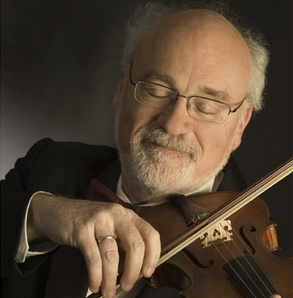I was a middling, lazy, appallingly unambitious violinist until, as an undergraduate, I met and began studying with Steven Staryk, then concertmaster of the Chicago Symphony. The miracle of Bach’s writing suddenly was revealed to me, it seemed. Staryk also had a baroque bow he let me try.
~Dan Stepner, Artistic Director, Aston Magna Music Festival
 My first violin was inherited from a grandfather I never knew. I still remember its look – dark brown, quite beaten up, with red, lacquered gut strings that spoke of the old country. It had a musty smell that may have contributed to my lack of enthusiasm for regular practice. But my parents were both musicians (my mother a wonderful pianist, and my father a bass player and conductor of school orchestras) and I was fated to play something. I believe they decided initially it should be violin, at least for a while. The gut was quickly replaced by contemporary metal strings which were de rigeur in my youth and are still the norm. I would never have guessed that some decades later I would be playing Baroque music on retrofitted instruments, strung with un-wound, un-lacquered gut strings.
My first violin was inherited from a grandfather I never knew. I still remember its look – dark brown, quite beaten up, with red, lacquered gut strings that spoke of the old country. It had a musty smell that may have contributed to my lack of enthusiasm for regular practice. But my parents were both musicians (my mother a wonderful pianist, and my father a bass player and conductor of school orchestras) and I was fated to play something. I believe they decided initially it should be violin, at least for a while. The gut was quickly replaced by contemporary metal strings which were de rigeur in my youth and are still the norm. I would never have guessed that some decades later I would be playing Baroque music on retrofitted instruments, strung with un-wound, un-lacquered gut strings.
I was a middling, lazy, appallingly unambitious violinist until, as an undergraduate, I met and began studying with Steven Staryk, then concertmaster of the Chicago Symphony. He played Bach in a style I had never heard before – lighter, more speaking, more agile than what I was used to. The miracle of Bach’s writing suddenly was revealed to me, it seemed. Staryk also had a baroque bow he let me try.
During those same years I sang Handel and Bach with a college chapel choir, and played in an unforgettable performance of Bach’s B Minor Mass under Robert Shaw. Baroque music in general came alive for me with that experience, and though I have never specialized exclusively in “early music,” I came to see this period as a sort of golden era for the violin and its repertoire – a period I must always be exploring.
I only program music I love, and so it’s hard to pick a favorite among the 2015 summer programs. But among the many pieces on this summer’s programs, I look forward to Vivaldi’s “Winter,” and to my reconstruction of Bach’s D Minor Concerto, and of course the grand Octet by Schubert.
